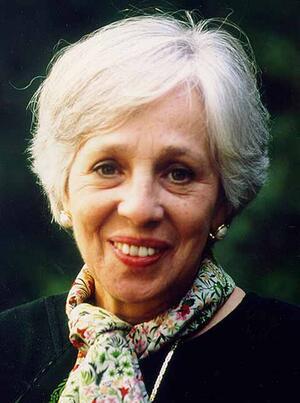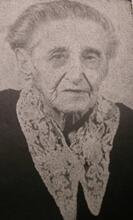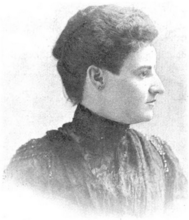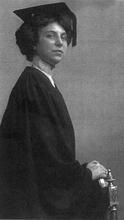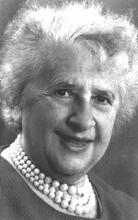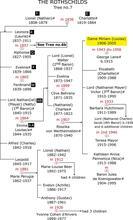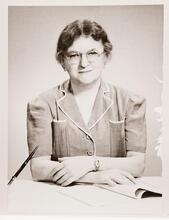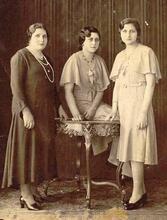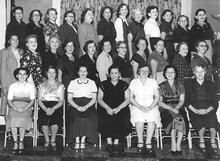Maxine Singer
The President of the United States recognized Maxine Singer's important contributions to biochemistry and molecular biology, her leadership of the Carnegie Institute and her science education initiatives, by awarding her the National Medal of Science "for her outstanding scientific accomplishments and her deep concern for the societal responsibility of the scientist."
Institution: Carnegie Institution
Maxine Singer joined the National Institutes of Health in 1956 and began decoding DNA and RNA, investigating how codes that replicate and insert themselves along DNA chains contribute to certain genetic diseases. From 1980 to 1987, she was chief of the Laboratory of Biochemistry at the National Cancer Institute. In 1988, she became president of the Carnegie Institution, a position she held for fourteen years. To combat the lack of women and minorities in the sciences, Singer created Project First Light, a pilot program where Washington, DC, elementary school students attend a creative Saturday science school at the Carnegie Institution; in 1994, she began the Carnegie Academy for Science Education, which ran summer institutes for elementary school teachers and provided curriculum support throughout the school year.
Family and Education
Maxine Singer was born on February 15, 1931, to Henrietta (née Perlowitz) Frank and Hyman Frank, both first generation Americans. Maxine grew up in Brooklyn, New York.
A product of the New York City public schools, Singer graduated from Swarthmore College (A.B., 1952, with high honors) and Yale University (Ph.D., biochemistry, 1957). She joined the National Institutes of Health as a postdoctoral fellow in 1956 and received a research staff appointment two years later. From 1980 to 1987, she was chief of the Laboratory of Biochemistry at the National Cancer Institute, where she led fifteen research groups engaged in various biochemical investigations. She served as President of the Carnegie Institution from 1988 until 2002 and retains her association with the National Cancer Institute as Scientist Emerita.
Early Career
Singer’s research contributions ranged over several areas of biochemistry and molecular biology, including chromatin structure, the structure and evolution of defective viruses, and enzymes that work on DNA and its complementary molecule, RNA. Around 1960 she collaborated intensely with her National Institute of Health colleague Marshall Nirenberg in the elucidation of the genetic code. Subsequently, her foremost contributions were in studies of a large family of repeated DNA sequences called LINES—sequences interspersed many times in mammalian DNA.
Singer and her co-workers were especially interested in the LINE-1 sequence, which is repeated thousands of times in human DNA. LINE-1, she early concluded, is capable of insertion into new places on chromosomal DNA, and researchers elsewhere later found that LINE-1 insertions into a gene whose product is required for blood clotting are associated with cases of hemophilia. Believing that the mechanism of LINE-1 transposition might have broad significance for understanding genetic diseases, Singer and her colleagues concentrated their experiments on learning how LINE-1 elements move.
Throughout her career, Singer took leading roles influencing and refining the nation’s science policy, often in realms having social, moral, or ethical implications. As a relatively young professional in 1967, she interpreted in the pages of Science the exciting experiments by Arthur Kornberg and colleagues synthesizing biologically active DNA in vitro—now seen as an early indicator of recombinant gene technology. The experiments, she predicted, “bring closer the day when the ability to manipulate genetic material can be used for improving the life of all humans.”
Her involvement in ethical issues arose as co-chairwoman of the 1973 Gordon conference where early concerns about risks in recombinant DNA research were raised. She was an organizer of the famous 1975 Asilomar conference and was one of five signatories of the summary statement of the Asilomar report, which drew up guidelines for recombinant DNA research. The report acknowledged the enormous apparent potential of recombinant DNA technology in molecular biology but noted the limited knowledge in 1975 of the potential biohazards. By recommending resumption of recombinant research but under very cautious safeguards, the report established the framework for the conduct of research and the gradual removal of restrictions as understanding grew in future years.
Among countless other roles in service to science and humankind, Singer became a member of the Board of Governors and Scientific Advisory Council of the Weizmann Institute of Science, Rehovot, Israel, in 1978. She was chairwoman of the editorial board of Proceedings of the National Academy of Sciences, 1985–1988. She was a member of The Human Genome Organization and member, Board of Directors, Johnson & Johnson. She was trustee, Yale (University) Corporation, 1975–1990, and director, Whitehead Institute, 1985–1994. She was elected to the National Academy of Sciences in 1979, and to membership in the Pontifical Academy of Sciences in 1986.
Awards and Later Career
Singer’s several awards for public service include the Distinguished Presidential Rank Award, awarded in January 1988 by President Reagan. In 1992 she received the National Medal of Science, the nation's highest scientific honor bestowed by the President of the United States, “for her outstanding scientific accomplishments and her deep concern for the societal responsibility of the scientist.” She received honorary degrees from Brandeis University, Dartmouth College, Williams College, New York University, Swarthmore College, Harvard University, Yale University, the Weizmann Institute of Science, and others.
During her fourteen years as president of the Carnegie Institution, Singer led the biologists, astronomers, and earth scientists of the Institution’s six scientific departments.
While guiding Carnegie in its scientific research and postgraduate education, Singer also directed a $50 million capital campaign which financed major renovations of the Institution’s campuses and its share in the building of two giant 6.5-meter optical telescopes (Project Magellan) at Carnegie’s Las Campanas Observatory in Chile.
Singer shared with most scientists a broad concern about such matters as the decline of math and science education in the United States, the lack of understanding in matters of science among the general population, and the underrepresentation of women and minorities in the scientific community. Reflecting this concern, Singer introduced project “First Light” where neighborhood third, fourth, and fifth graders attend an imaginative Saturday science school in the Carnegie Institution administration building in downtown Washington, D.C.—a venture which attracted attention as a possible pilot for application elsewhere.
In 1994, Singer initiated the Carnegie Academy for Science Education (CASE), which includes six-week summertime institutes for elementary-school teachers along with continuing associations throughout the school year; the Academy is intended to bring the innovative techniques of “First Light” to the city’s public-school teachers. With Paul Berg, Singer wrote the textbook Genes & Genomes, in use by students of molecular genetics worldwide; the later Dealing with Genes was designed to acquaint a wider readership with modern genetics.
Accustomed to speaking out clearly and strongly on matters facing modern society, Singer was both spokesperson and leader on issues related to the promise of genetic manipulation for use in research and in the curing of disease. She publicly supported the nation’s investment in the human genome project. In congressional testimony, she challenged the wisdom of spending heavily for biomedical research in space.
Singer was married to Daniel Morris Singer; the couple had four children.
Maxine Singer died on July 9, 2024.
Selected Works
Singer, M. F. “Commentary” In 2001 AAAS Science and Technology Policy Yearbook, edited by A. H. Teich, Stephen D. Nelson, Celia McEnaney, Stephen J. Lita, 161–164. Washington, DC: 2001.
Singer M. F. “Enhancing the U.S. Postdoctoral Experience.” Issue in Science and Technologie, xvii (1), (2000): 43–46.
Singer M.F. “Shaping the Future for Women in Science. Women in Cell Biology.” The ASCB Newsletter 23 (2), (2000): 15–18.
Singer, M.F. “Believing Is Not Understanding.” The Washington Post, Op Ed page. August 18, 1999.
Berg, P. and Singer, M. “Inspired Choices.” Science 282 (1998): 873.
Berg, P. and Singer, M. F. “Regulating Human Cloning.” Science 282 (1998): 413.
Clements, A.P. and Singer, M. F. “The human LINE-1 reverse transcriptase: Effect of deletions outside the common reverse transcriptase domain.” Nucleic Acids Res (1998).
Hohjoh, H. and Singer M.F. “Ribonuclease and high salt sensitivity of the ribonucleoprotein complex formed by the human LINE-1 retrotransposon.” J Mol Biol 271 (1997): 7–12.
Hazen, R.M. and Singer, M. Why Aren’t Black Holes Black? New York: 1997; Singer, M. and Berg, P. Exploring Genetic Mechanisms. Sausalito, California: 1997.
Hohjoh, H. and Singer, M.F. “Sequence-specific single-strand RNA binding protein encoded by the human LINE-1 retrotransposon.” EMBO J 16 (1997): 6034–6043.
Singer, M. “Thoughts of a nonmillenarian.” Bulletin of the American Academy of Arts and Sciences LI (2) (1997): 36–51.
Hohjoh, H. and Singer, M.F. “Cytoplasmic ribonucleoprotein complexes containing human LINE-1 protein and RNA.” EMBO J 15 (1996): 630–639.
With permission of the Carnegie Institution, Washington, D.C.

